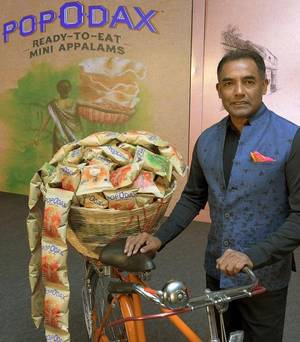Ready-to-eat appalams in packets — that’s what the newly-launched Popodax is all about
M Lankalingam, Chairman MD and Innovation Head, Lanson Group, remembers the time he tried to fry appalam at the Anuga (food fair) in Germany.“This was in 1988. I had just joined my father and was in charge of frying the appalams,” he says. It proved to be a rather complicated task: there were restrictions on stoves, he says, and the one provided wouldn’t heat beyond 180 degree Celsius. “An appalam is an obstinate customer, it will not fry unless the temperature is exactly 200 degree Celsius.” But when he finally obtained a stove that did go up to that temperature, “it went crazy,” spattering him with hot oil. “My suit got completely blotched,” he grins.
Despite the stains on his suit, the incident turned out to be a fortunate one. A photograph of him making appalam became his marriage alliance photo, “to impress the girl and show her I could cook,” he smiles. She was indeed suitably impressed. “She didn’t know that the only thing I could cook was appalam,” says Lankalingam, whose exclusive appalams (they are called poppadums in England) have finally come home after spending the last 40 years traipsing around the world.
Journey into the past
Swag jostled with legacy at the launch of Popodax, a range of flavoured-ready-to-eat appalams, on Saturday. “We started exactly 40 years ago,” says Lankalingam at the launch, recounting the story that has now almost become an urban legend:
The year was 1978. On one of his trips to the UK, Lankalingam’s father S Murugesu, discovered that the poppadums served at the local bars were of poor quality. So he decided to do something about it. Enter the wafer-thin, perfectly proportioned urad dal pancakes made in pristine factories in South India, then exported abroad in a cook-to-eat format. “People laughed at him, but I believe that if you make a world class product it will work,” says Lankalingam, adding that what started as a quick bar snack soon crept into the pantries, kitchens and dining tables of the UK.
Realising that the average British home-maker neither had the time nor the vessels to fry these appalams, they decided to take it up a notch. “We launched the ready-to-eat version in 1987,” he says, adding that the factories in the UK that take care of this step are highly mechanised. Currently, they hold an 80 percent share of the market there, supplying numerous brands including Sharwood — that supplies to the Buckingham Palace — with these golden circles of crunch and joy. “People in England have a curry night regularly,” he says, where they recreate the Indian restaurant experience with curried meats, naan, flavoured rice and more, bought off supermarket shelves. And poppadums are an ubiquitous part of this meal, of course.
The long way home
A fiery orange cycle is parked in the corner of the ballroom at the Taj Coromandel Hotel in Nungambakkam. On its carrier is a basket from which long trails of air-filled, sealed packets peek out. We tear them open — like a packet of potato chips, they deflate — and delve into it. The bite-sized portions that come in three flavours are all that an appalam should be — crunchy, crackly, delicious. “I have always regretted that we never had our own brand,” he says, adding that this is the first time in forty years that they have had the guts to come into the local market.
So what has changed? “The new generation doesn’t know much about the appalam, “ he says. “We are losing our roots, our Indianness. This whole idea of Poppodax is a journey backwards into the future.” He draws a parallel between appalam and yoga. “Unless it is reinvented, repackaged, and delivered back, no one seems to want it.”
Our sense of culture and traditional knowledge is currently vested largely in the hands of the older generation, he points out. “If all our grandmothers died, we would be wiping out a lot of our culture.” Mechanisation, on the other hand, could help sustain tradition and help the current generation discover their roots. “We want to be a catalyst to this process,” he says.
source: http://www.thehindu.com / The Hindu / Home> Life & Style> Food / by Preeti Zachariah / April 23rd, 2018
